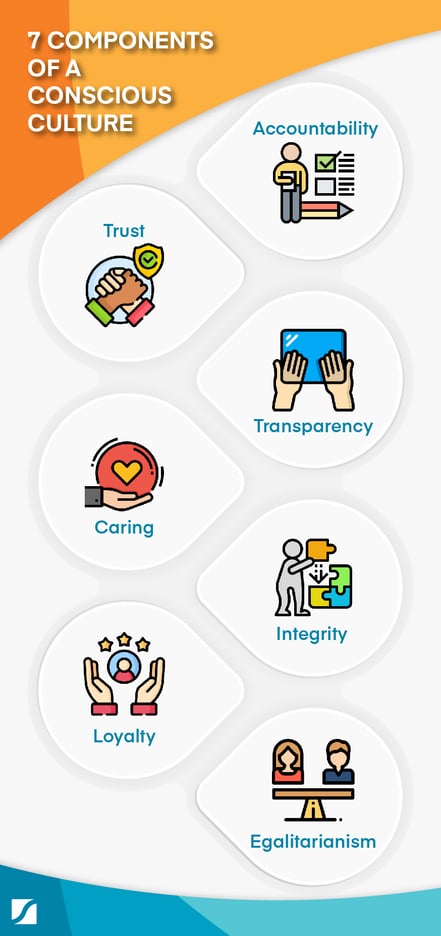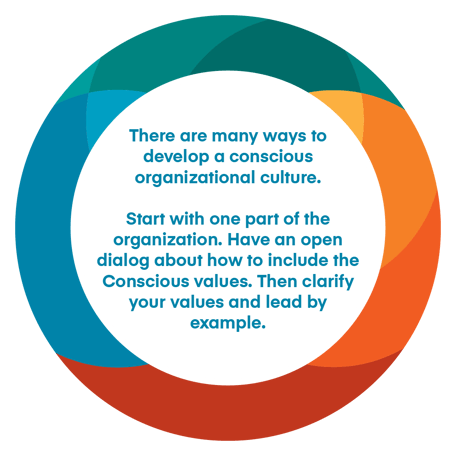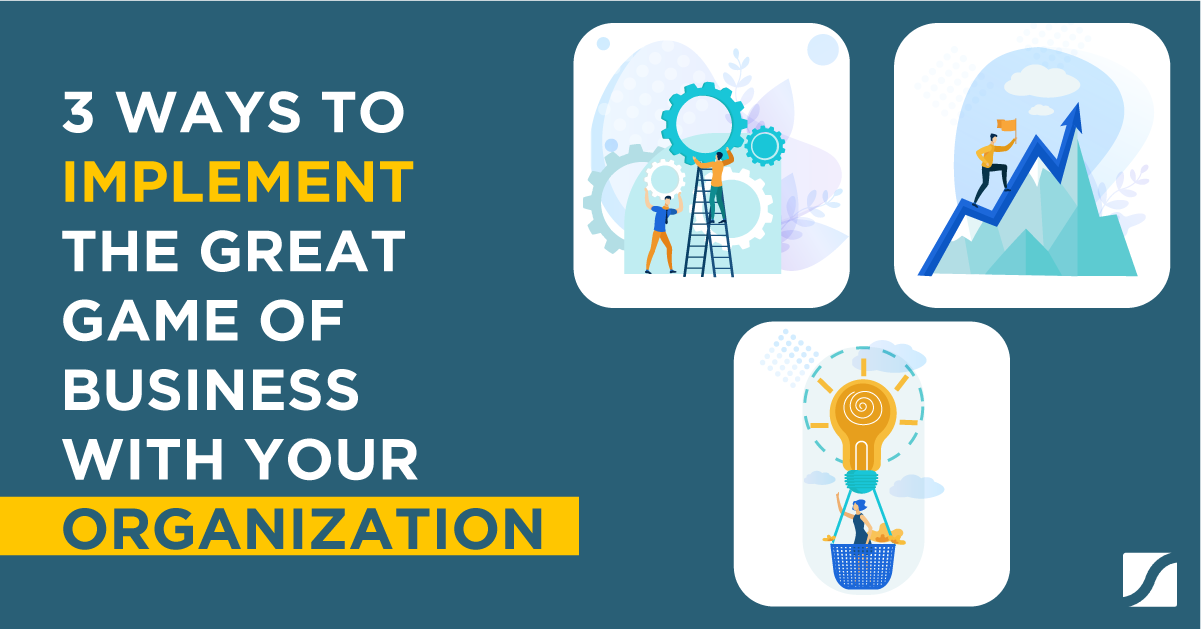7 Essential Qualities Of a Conscious And Profitable Organizational Culture

Have you ever been caught in the trap of making tradeoffs between doing well and doing good? A short-term focus on revenue at the expense of all else can be not only stressful and exhausting, but in the long-run hurt profit and growth.
There is a better way.
Conscious capitalism provides a framework for business leaders who don’t want to sacrifice values for profit. It’s based on a simple premise – that caring for your customers, your employees, and your community, is good for business. When your core values are part of your business culture, you not only build loyalty, but also create a more sustainable enterprise in the long run.
In this post, we’ll focus on 7 qualities of conscious organizational cultures. Then we’ll show how those qualities support innovation, help navigate difficult times, and look at how to bring more of these qualities into your own organization.
Why is organizational culture important?
Culture affects every aspect of a business from employee benefits to contract fulfillment. A positive culture leads to…
- More creativity and innovation
- Greater employee satisfaction
- Higher productivity
- Greater stakeholder loyalty
According to PWC’s recent global survey of 3,200 business leaders from around the world, 72% of CEOs believe that culture is a determining factor in the success or failure of initiatives for change. In addition, 67% ranked culture as the most important factor -- more important even than strategy or operations.
When organizational values are clear and widely shared, it becomes easier for leaders and employees to make decisions. Increased trust reduces the need for micromanagement. And when everyone understands and buys into the company's mission, they are more likely to go above and beyond their job descriptions to help achieve common goals.
What are the components of a conscious culture?
There are seven primary qualities of a conscious organizational culture.
Let's take a closer look at each.
- Trust
- Accountability
- Caring
- Transparency
- Integrity
- Loyalty
- Egalitarianism

Trust is the foundation of any relationship. It is essential in the workplace, where people are asked to take risks and share their ideas. When employees trust their leaders, they are more likely to be open and honest. And when stakeholders trust a company, they are more likely to do business with it.
Accountability builds trust and respect. It also sends a message that everyone is responsible for the success of the organization. When employees know they will be held accountable, they are more likely to take ownership of their work and be proactive in finding solutions.
Caring creates a positive emotional environment in which people feel valued and appreciated. It also builds loyalty and organizational commitment. Caring leaders are more likely to receive cooperation from their employees, leading to a more productive work environment.
Transparency breeds trust. When employees and stakeholders understand the organization’s purpose, core values, and goals, they feel more invested in the company’s success. Transparency also allows people to make better decisions, as they have the relevant information.
Integrity is about doing the right thing, even when no one is looking. It means following through on commitments and living up to ethical standards. When leaders and employees act with integrity, it builds trust and strengthens relationships.
Loyalty is a two-way street. Employees are more likely to be loyal to a company that values them and their contributions. And companies that foster loyalty among their employees reap the benefits of lower turnover rates and increased productivity.
Equality means everyone is treated fairly, regardless of rank or position. It creates an environment where people feel they can contribute their best ideas and be themselves. When everyone is treated equally, it builds trust and respect.
Conscious culture at Envision IT: a case study
Nancy Pautsch, President of Envision IT, a technology company headquartered in Oakland, CA, emphasizes the qualities of caring and trust. They work hard to build an atmosphere that fuels innovation and creativity.
Pautsch wants her employees to feel comfortable bringing up crazy, ‘wackadoodle’ ideas – and know that the Envision IT family will build on those ideas.
Their focus on organizational let do 100% employee engagement, according to internal survey from January 2020. Still, they strive to improve.
“In the technology industry, if you’re not being creative, you’re not going to be very competitive. That culture of creativity becomes an important differentiator for us,” Pautsch said.
Conscious Culture During a Restructuring: Case Study
During times of change, the qualities of loyalty and transparency are especially important. Karen Sammon, Executive Strategist & Board Member of Next7 Gens, shares how she led PAR Technologies through a restructuring with a focus on these qualities.
“It was important to hold our higher purpose front and center and stay close to our values,” Karen said. “People do amazing things when there’s trust as a foundation. A conscious culture is energizing in good times, but essential during hard times.” Her team incorporated this quality into their daily routine. For example, they took the time to have difficult conversations about the restructuring with every PAR staff member.
Her team incorporated this quality into their daily routine. For example, they took the time to have difficult conversations about the restructuring with every PAR staff member.
Pautsch’s team explained the reasons for the change and how it would affect each employee’s position at PAR. They also targeted valuable resources to help the people who were laid off find new placements.
“You have to do what’s right for your business,” she said. “But do it with integrity, transparency and care.”
What Are The General Principles Behind Conscious Culture?
There are many ways to create a conscious organizational culture. Here are a few suggestions:
- Start by setting the example yourself. Be honest, accountable, and transparent in your own dealings.
- Encourage employees to share their ideas and offer feedback.
- Promote a culture of caring by valuing people's contributions and treating them with respect.
- Foster loyalty among employees by recognizing their contributions and treating them fairly.
- Treat all members of the organization equally, regardless of rank or position.
How Can a Company Achieve 100% Employee Engagement?
There is no single recipe for creating employee engagement, but it is an intentional process. Start an open dialog to understand what employees care about. Then create an organizational culture that supports their needs.
Some organizations offer educational opportunities or paid volunteer experience. Others provide gym memberships, pet insurance, or remote work options.
But employee engagement goes beyond benefits. Develop an onboarding and offboarding process that reflects your values. Bring consciousness to cost-reporting and KPIs.
The only mistake you can make is to fail to define organizational values or to assume that those values are evident and don’t need to be communicated.
Conclusion: How to use Conscious Capitalism to shift your organizational culture
There are many ways to develop a conscious organizational culture.
Start with one process or part of the organization, and have an open dialog about how to include the values of trust, accountability, caring, transparency, integrity, loyalty, and egalitarianism. Then clarify your values and lead by example.
Achieving employee engagement starts with understanding what your employees care about and creating an organizational culture that supports their needs.
What is most important to you about building a conscious culture? Which strategy from today’s post are you going to try first?



